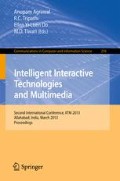Abstract
Software project success or failure depends on the ineffective software project management. Success or failure of any project can be attributed by incorrect handling of one or more project variables such as people, proper technology, proper project scheduling and selection. Among these attributes proper project selection is one of the most vital part of software project management. There exist many uncertainties in project management and current software engineering techniques are unable to eliminate them. So there is huge scope for developing. The current researchers have developed a unique model which is capable to take decision on the field of software project selection. This model has two embedded sub models namely fuzzy AHP (Analytic Hierarchy Process) and strategic game model. Here in the first case experts opinions are considered under fuzzy environment and in the second case, different decisions makers act as players in the game module. Different criteria are taken into consideration for choosing optimal strategy of the players. An elaborated case study is also analyzed for testing the output of the system.
Access this chapter
Tax calculation will be finalised at checkout
Purchases are for personal use only
Preview
Unable to display preview. Download preview PDF.
References
Bakshi, T., Sanyal, S.K.: A Soft-Computing approach for Software Project Selection. In: International Conference on Recent Trends in Information Systems. IEEE (2011) ISBN: 978-1-4577-0792-6/11/$26.00
Hwang, C.L., Yoon, K.P.: Multiple Attribute Decision Making and Introduction, p. 2. Sage Publication (1995)
Bakshi, T., Sarkar, B.: MCA based performance evaluation of project selection. International Journal of Software Engineering and Applications (IJSEA) 2(2) (April 2011)
Bakshi, T., Sarkar, B., Sanyal, S.K.: An Optimal Soft-Computing Based AHP-QFD Model Using Goal Programming for Decision Support System. International Journal of Scientific & Engineering Research 3(6) (June 2012)
Saaty, T.L.: The Analytic Hierarchy Process: Planning, Priority Setting. Resource Allocation, 287 p. Mcgraw-Hill (1980)
Satty, T.L.: The Analytic Network Process. RWS Publications Pittsburgh (1996)
Hwang, C.L., Yoon, K.: Multiple Attribute Decision Making: Methods and Applications. A state of the Art Survey, 1st edn, 259 p. Springer (1981)
Wang, T.C., Lee, H.-D.: Developing a fuzzy TOPSIS approach based on subjective weights and objective weights. Expert Systems with Applications 36(5), 8980–8985 (2009)
Datta, S., Beriha, G.S., Patnaik, B., Mahapatra, S.S.: Use of compromise ranking method for supervisor selection: A multi-criteria decision making (MCDM) approach. International Journal of Vocational and Technical Education 1(1), 007–013 (2009)
Zavadskas, E.K., Turskis, Z., Tamosaitiene, J., Marina, V.: Multicriteria selection of project managers by applying grey criteria. Technological and Economic Development of Economy 14(4), 462–477 (2008d)
Zavadskas, E.K., Kaklauskas, A., Turskis, Z., Tamosaitiene, J.: Multi-attribute decision-making model by applying grey numbers. Informatica 20(2), 305–320 (2009b)
Srinivasan, V., Shocker, A.D.: Linear programming techniques for multidimensional analysis of privileged. Psychometrika 38, 337–369 (1973)
Bayrak, M.Y., Elebi, N.C., Kin, H.T.: A fuzzy approach method for supplier selection. Production Planning & Control 18(1), 54–63 (2007)
Bevilacqua, M., Petroni, A.: Traditional purchasing to supplier management: a fuzzy logic-based approach to supplier selection. International Journal of Logistics Research and Applications 5(3), 235–255 (2002)
Tuzkaya, G., Ozgen, A., Ozgen, D., Tuzkaya, U.R.: Environmental performance evaluation of suppliers: a hybrid fuzzy multi-criteria decision approach. International Journal of Environmental Science and Technology 6(3), 477–490 (2009)
Razmi, J., Rafiei, H., Hashemi, M.: Designing a decision support system to evaluate and select suppliers using fuzzy analytic network process. Computers & Industrial Engineering 57(4), 1282–1290 (2009)
Sreekumar, Mahapatra, S.S.: A fuzzy multi-criteria decision making approach for supplier selection in supply chain management. African Journal of Business Management 3(4), 168–177 (2009)
Sevkli, M., Koh, S.C.L., Zaim, S., Demirbag, M., Tatoglu, E.: Hybrid analytical hierarchy process model for supplier selection. Industrial Management & Data Systems 108(1), 122–142 (2008)
Nagoorgani, A., Revathy, K.: Equilibrium Analysis in Prisoner’s Dilemma using Fuzzy Numbers. International Journal of Algorithms, Computing and Mathematics 2(3), 9–13 (2009)
Dytczak, M., Ginda, G.: Multi-Criterion Evaluation of Development Strategy Components in the Presence of Inangibles and Uncertainty. In: 19th International Conference on Systems Engineering. IEEE (2008) ISBN: 978-0-7695-3331-5/08
Chen, Y.W., Larbani, M.: Multiple Attribute Decision Making in Dynamics:A Multi-Objective Game Approach. In: MCDM 2004, Whistler, B.C, Canada, August 6-22 (2004)
Peldschus, F., Zavadskas, E.K., Turskis, Z., Tamosaitiene, J.: Sustainable Assessment of Construction Site by Applying Game Theory. Inzinerine Ekonomika-Engineering Economics 21(3), 223–237 (2010) ISSN 1392-2785
Payne, J.W., Bettman, J.R., Johnson, E.J.: Behavioural Decision Research: A Constructive Processing Perspective. Annual Review of Psychology 43, 87–131 (1992)
Luce, R.D., Raiffa, H.: Games and Decisions: Introduction and Critical Survey. Wiley & Sons, New York (1957)
Chang, D.Y.: Theory and Methodology Applications of the extent analysis method on fuzzy AHP. European Journal of Operational Research 95, 649–655 (1996)
Dodangeh, J., Mojahed, M., Yusuff, R.M.: Best project selection by using of Group TOPSIS Method. In: International Association of Computer Science and Information Technology-Spring Conference
Author information
Authors and Affiliations
Editor information
Editors and Affiliations
Rights and permissions
Copyright information
© 2013 Springer-Verlag Berlin Heidelberg
About this paper
Cite this paper
Bakshi, T., Sarkar, B., Sanyal, S.K., Sinharay, A. (2013). An ε- Optimal Strategy of Algorithmic Game Theory for Project Selection under Fuzziness. In: Agrawal, A., Tripathi, R.C., Do, E.YL., Tiwari, M.D. (eds) Intelligent Interactive Technologies and Multimedia. IITM 2013. Communications in Computer and Information Science, vol 276. Springer, Berlin, Heidelberg. https://doi.org/10.1007/978-3-642-37463-0_20
Download citation
DOI: https://doi.org/10.1007/978-3-642-37463-0_20
Publisher Name: Springer, Berlin, Heidelberg
Print ISBN: 978-3-642-37462-3
Online ISBN: 978-3-642-37463-0
eBook Packages: Computer ScienceComputer Science (R0)

